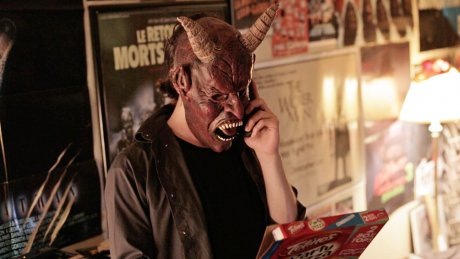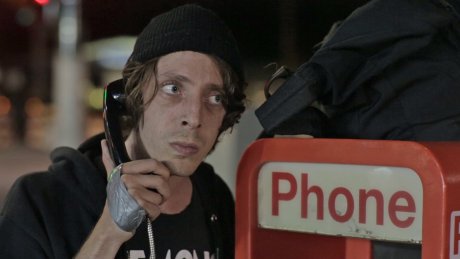I’d love to hear a little about the production itself. How many shooting days you had, if you had rehearsals or did improvisation, what camera you shot with, anything you want to share about your process.
JP: It’s pretty bare bones and minimal. The crew is basically just me and the producers, and we shot on a Canon 5D Mark III that I bought on eBay, and then after we shot I sold it on eBay. So no harm done there to my wallet! We shot for 30 days straight, which is pretty abnormal for us. On our last film we [shot] weekends for six months.
JB: Whenever we could fit it in.
JP: Yeah. But for this one we took it way more seriously. We actually rehearsed for eight months once a week. For four or five hours, we’d meet at Josh’s house and go from the beginning of the script to the very end, just to make sure that it felt right, it felt real, that the dialogue fit.
JB: Just establish everything so well so that by the time we were on set, we didn’t waste any time.
JP: I would always read for the character of Derek, and after awhile, all of the producers watching would just die laughing and were like, “come on, you gotta be Derek.” So that’s kind of how that worked out. Josh and I have a different chemistry and had been rehearsing for eight months, so when you try and bring in an actor, as good as they were, they just didn’t have the back and forth that we could do. By the time we got to set, we knew the important things that we needed to nail in a scene, and we could just goof around the rest of the time and throw in crazy lines and try to make each other laugh. That was the funnest stuff. We shot the first weekend in that basement, and so everybody could just loosen up and we could improvise.
JB: We ended up doing quite a bit of improvising with dialogue at least.
JP: Yeah, there are a lot of good deleted scenes that exist out there, because we shot a lot in that basement and just goofed around. Even the treadmill with the Bugles on it; that was shot in our producer’s parents’ basement and they happened to have a treadmill down there.
JB: That wasn’t in the script.
Really?
JP: Yeah, it’s just, like, we can do some funny stuff with this treadmill here, let’s open up that bag of Bugles, let’s do this. Even for the angrier, darker stuff, when Marty’s mad at Derek, it was important for Josh to feel comfortable enough to be mean, [to be] really nasty to me, and he could say whatever he wanted, and he knew it was just Marty and Derek; it was nothing personal. When we had to fight, it was, like, let me have it, man — get real. There’s a level of comfort there that you just can’t act your way through. So that was important.
Did you have a D.P. who shot the movie?
JP: Yeah, this was actually the first time I’ve had an actual D.P. It was my friend Adam from high school, and he’s a photography major and real camera nut. But I had picked him. I wanted him to shoot this one from the very beginning so that it worked out a little easier when it came time for me to play Derek. Because on our last film Ape, I was the D.P. and camera guy. So I wanted this one to be a little more… I wouldn’t say slick-looking, but not as dirty and noisy as Ape. As much as I love that, some shots are a little rough. So he was able to bring his knowledge as a photographer to be the D.P. on this one. And he’s a lot more patient than I am. I’m very impatient. So sometimes I’m like, “Come on, come on, let’s go, let’s shoot it,” and he’s the guy who’s like, “hold on, give me five more minutes.” And that’s important to have somebody I’ve known for a long time being able to tell me, “give me five more minutes, man,” and not feel pressured that I’m the director and what I say goes.


You’ve talked a lot about DIY filmmaking. I’m curious why you decided to go with a distributor for this film?
JP: They’re Oscilloscope. As much as I think we can do everything by ourselves, we can’t. And just having a distributor has opened up so many more doors than I ever thought possible. Just having them attached to it makes things so much easier. The distribution world, DIY, it’s exhausting. I don’t think I know what I’m doing. To have somebody as cool as Oscilloscope have our back? That’s totally awesome.
JB: Yeah, I only know DIY creation… [Laughter]
Could you talk a little bit about the music you used in the film? Did you always have those songs in mind?
JP: In the script, I think it always said, like, “loud metal bursts through the soundtrack.” And it took me awhile to find a lot of that music. I’m really picky. Especially the last scene, the run scene; I didn’t realize that there’s a rhythm that you have to match to Josh’s running. I measured his BPMs, the beats per minute of his run, every step. So it took awhile to find the right song that fit not only the beats and the rhythm of his run, but it had to be loud and angry and also had to have a feeling of… I mean, most people listen to the song and it’s just loud, but for me, I’m a big metal fan, so that song feels uplifting in almost a weird way. It feels like a U2 metal song. I actually went to high school with the drummer for that band, and so I’ve been aware of them for a long time. I’m a big fan, and it was, like, “yeah, this is right.” The music had to be very specific for Marty’s stuff. It couldn’t be dopey heavy metal, and it couldn’t be rap metal. There’s a very specific sound I was looking for, that was more from sludge thrash metal music. It’s hard to pinpoint, but there are certain bands that just fit the Marty vibe. And we had other songs that we put on there [for] the run scene, and it was amazing, but it just wasn’t something Marty would listen to. I was very particular about what would Marty listen to.
So you chose all of the music yourself? You didn’t work with a music supervisor?
JP: No, no. That’s super important. I can’t imagine putting that in someone else’s hands.
JB: It’s all your gut instinct.
JP: Yeah. I scoured albums for months and months before I found a good fit. It’s really important.
By the time we got to set, we knew the important things that we needed to nail in a scene, and we could just goof around the rest of the time and throw in crazy lines and try to make each other laugh.
As a musician, did you have any input? [to Josh]
JB: No, I trust Joel on that stuff. I know when he knows what he wants, it’s gonna be the right call.
JP: I’m gonna let Josh pick all of the music when we do our Motown tribute movie. [Laughter] Our different Detroit movie.
JB: Yeah, I’ll demand input then.
JP: Josh and his band Chance Jones are very much digging on the Motown scene.
JB: It’s really close to my heart.
JP: A lot of the folk world too.
JB: British invasion.
Is that a future project that you have in mind?
JP: I don’t know.
JB: It is now! [Laughter]
JP: We’ll make our British invasion movie, which means two characters go into Britain and just fight people in the street.
JB: Yeah!
JP: “What are you doing?” “It’s the British invasion!” “No, mate, that’s a musical genre!”…A weird, misguided British invasion film, that’d be a great short film, just a couple of Americans attacking people on the streets of London.
JB: With the best intentions.
JP: I don’t know what it would be…

Last question: which scene was the funnest for you to shoot and which was the most challenging?
JP: The funnest for me was watching this guy shove all of this spaghetti in his mouth. Because that wasn’t written into the script, that was just him; he just started eating it that way. I was just mesmerized. And when I yelled cut, I gave him a big hug and just felt like this is the kind of movie I want to make here, just a guy enjoying spaghetti so much, just in a whole different world. The most challenging — and it might be the same for Josh — was the phone call to his mom, for two different reasons. He had to hit an emotional beat — it had to be one take — but we had to find the right location. That was one [scene] where we didn’t have the location set. It was, like, “Let’s just get a car and drive around. We’ll find a payphone.” Well, that’s way harder than it sounds nowadays.
JB: There aren’t very many left.
JP: Not only are there not very many left, but there aren’t very many that have decent natural light near them. Because we didn’t bring in lights for any of this movie, we just used whatever light was available.
You used all natural light?
JP: Yeah. So we had to find a payphone with some good light, one that wasn’t near a freeway or a lot of traffic. And we found one, but believe it or not, people were using it, like waiting in line! And Josh is trying to be in character and deliver this emotional call to his mother, and people are waiting for the payphone? And I was like, “sorry, man, we gotta go somewhere else.” It just took so long, but it was so important. How about yours? [to Josh]
JB: The stuff that happened in the basement was the funnest. Because it was just hanging out and me trying not to crack up, but as soon as the word “cut!” was yelled, we were busting up. But then I think the most difficult thing also happened in the basement, which is us fighting. Because it’s tough to get to that part, where you’re raging and beating up your friend.
JP: There were a few technical problems too with continuity and sound and stuff, so we had to reshoot that scene quite a few times, and it was exhausting emotionally and physically.
JB: It really was, yeah. The basement stuff was all the first weekend too, so maybe we were just going for it.
JP: And we had a lot of time to just loosen up and improvise. Yeah that was a lot of fun.
